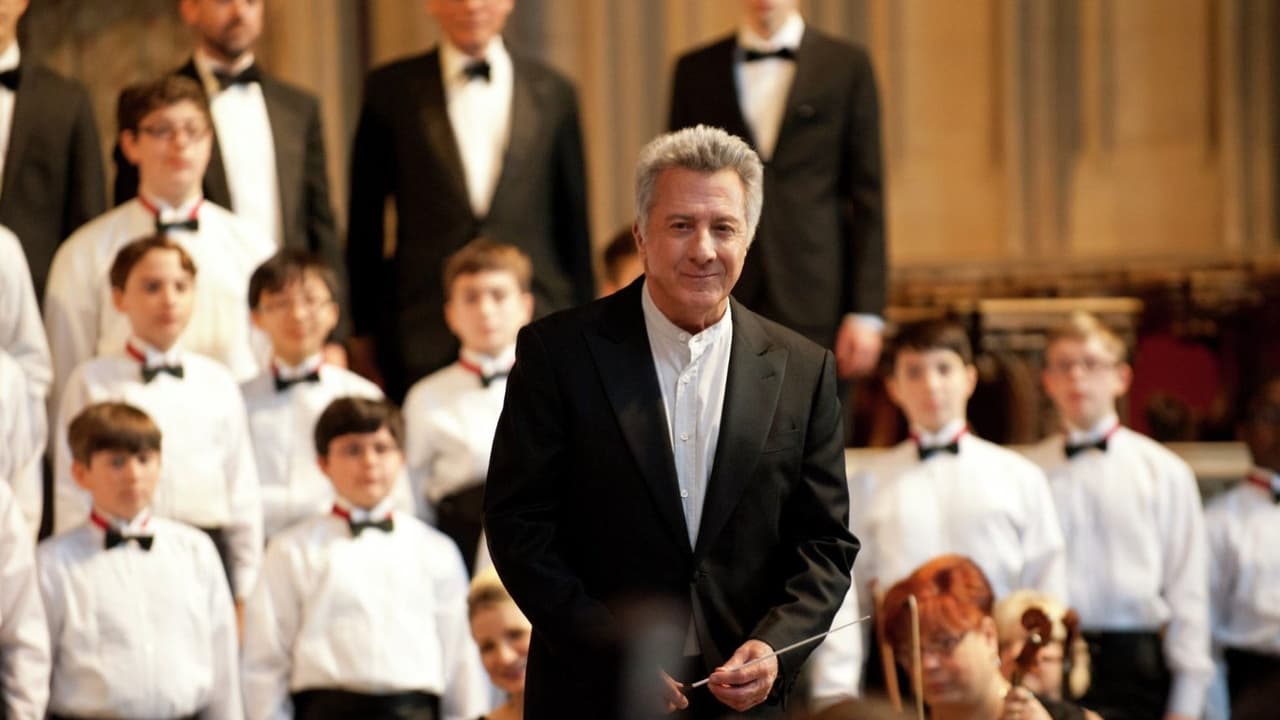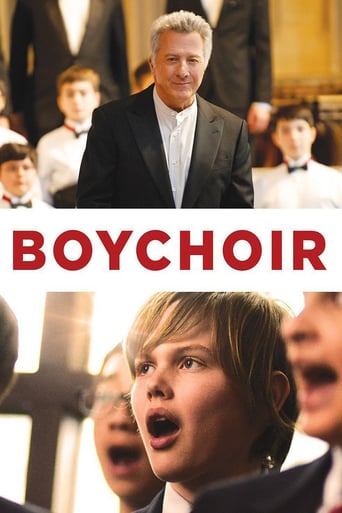

Purely Joyful Movie!
... View Morean ambitious but ultimately ineffective debut endeavor.
... View MoreI think this is a new genre that they're all sort of working their way through it and haven't got all the kinks worked out yet but it's a genre that works for me.
... View MoreOne of the film's great tricks is that, for a time, you think it will go down a rabbit hole of unrealistic glorification.
... View MoreI recently caught this movie on VoD - and was really glad to have found it. While I agree with the other reviews here that the script and storyline are fairly predictable, what really makes this movie worth watching (and watching again) are two things : the music, and the performances. Talking of performances, Dustin Hoffman delivers a brilliant performance as expected of him. Particularly a few key moments really shine through with his under-toned delivery - like the scene in the school boardroom. Kathy Bates plays the perfect spoil to the uptight staff at school - and it is a joy to watch her. Equally brilliant is Debra Winger - who has perhaps just a few small scenes - and yet delivers a performance that adds to the movie. While I am no expert in music, the music slowly pulls you into the story, and really helps build the emotions in the story as we go along. I have watched this movie again - and the music itself forms a key character in the movie - I guess the credit goes to the Director to integrate the music so seamlessly. Overall it is a pleasant and uplifting - if sometimes light and cheesy - experience.
... View MoreThe music in this film is almost all modified, some might say butchered, to fit the needs of the editing and pacing. The modified versions, however, are beautifully sung. So much for the purists among us. Since this problem is well covered by other reviewers here, let me move on.The DVD extras reveal that in the minds of the filmmakers - director, actors, et al. - a central "message" of the movie is the too-familiar cliché of films pointed at children, that one can achieve anything with enough determination, hard work, and perseverance. To make that premise work, our hero, Stet (Garrett Wareing) must struggle with failure, hopelessness, rejection and conflict -- which he does -- and must overcome it using tools he discovers inside himself -- which he also does. What he does *not* do - or rather, what the script does not allow him to do - is give us a clue about where the miracle of his serial transformations comes from. We are left with a roller-coaster ride in which at takeoff he is troubled and seemingly alone, and at the end he is triumphant. Along the way, all we see are the peaks and valleys, with no view of the tracks he's riding on, the weather conditions, or even his real reason for taking the ride in the first place. I realize that to solve this problem, you might need the cinematic equivalent of Wagner's Ring (a 21-hour opera), so maybe it's too much to ask. It could also be solved by having a hero who has dreamed of joining a boychoir and prepared himself for years, whose difficulty is only the fact that he hasn't had the chance until opportunity unexpectedly knocks. That way we'd already know why (and how) he is able to overcome the obstacles that the rigorous choir standards put in his way.I cannot leave this review without a serious condemnation of this film's injustice to Händel's Messiah, specifically his chorus, Hallelujah (Part the Second, No.44 in most editions). Other reviews have rightly criticised this mistreatment as unworthy of a serious film about a world class boychoir. (I might add that I am astonished that the American Boychoir even agreed to record it in the first place.) It would have been unconscionable enough, had the filmmakers merely added the descant with the sycophantic high-D to the "arrangement" as it appeared in the film. But they went even further, and inserted a conversation into the script in which Drake (poor, clueless, brilliant Eddie Izzard who should have been able to depend on the scriptwriters for historical accuracy) proposes that they "one-up" the Vienna Boys Choir by writing a descant - "we write a new solo part; they were all doing it back in those days; keep it in the same key, and hit a high D". At first blush he's right - descants were commonplace, and are still being written today - but for hymns and folk songs, not fully-composed pieces, published in authorised editions, such as Messiah. I would surrender my entire reputation - undergraduate music degree, sixteen years of professional (i.e., paid) choral singing, and a thorough familiarity with Messiah performance practice going back to 1960, when I was fourteen - if anyone can document even a single instance of a solo descant being associated with Hallelujah in any creditable edition or performance. A descant hovering over Hallelujah would be rather like a beautiful sunset painted over the countryside behind the Mona Lisa. Sunsets are beautiful crowd-pleasers, but for over 500 years, the Mona Lisa as originally portrayed has been quite enough for viewers to marvel at. So with Hallelujah: pleasing crowds quite adequately, thank you, since 1741. The worst result, of course, is that this ill-advised detour from history and musicality may well be viewed by some young musician who will naïvely regard it as truth, since it was presented in such a realistic setting. Inexcusable only begins to describe it.
... View MoreYou're at the starting point of a walk through many movies (particularly this one and a certain immensely popular franchise) and still more works of Young Adult fiction. It can't contain any spoilers unless you were born yesterday. In that case, it may spoil the whole genre.This should give you the general, not to say generic, idea. A largely orphaned 11-year-old boy with one or more unsympathetic parent figures is sent to a boarding school for children with a special gift. The school is located far out in the country, in a shadowy stone edifice of medieval design. All of the pupils are gifted, but our hero/surrogate is more gifted than the rest. The squabbling faculty includes a martinet, a mentor to our hero, and a revered Master. The Master, whose eyes may or may not twinkle, will become our hero's super-mentor and ace in the hole.The pupils learn the arcana of their art in the classroom and practice it on their own till they can accomplish amazing feats. Among them our hero finds at least one amiable buddy, at least one garden-variety tormentor, and exactly one Aryan-looking arch rival whose malice is a bit thick. He gives the arch rival a well-deserved thrashing, but they do not become best friends afterward as in Young Adult fiction of an earlier era. In fact, our hero couldn't keep out of trouble if he tried (he seldom does), but it's all right because he's the most special child on the premises.Now we jump briefly to another genre. It's the day of the big show, and the star is suddenly out of it. Our heroine (read hero, in the case of Boychoir) must fill in. She'll be all right, they tell her, though they're sweating bullets inside. She's got it in her, she knows the routine by heart. All she has to do is follow the maestro's eyes or the bouncing ball or something. She's going out there a kid, but she's got to come back a star. Yes, she'd blow it if this were only the third reel, but it's almost the end of the movie. So.Now back to the first genre and the denouement of our hero's story. Through superior talent and a bit of learning, he has risen to every challenge. Even if he doesn't get a letter of recommendation from the Master (you'll just have to watch and see about that), we know he has been recognized as the greatest prodigy that ever passed through Hogw--, er, Boychoir School.And that, unfortunately, seems to be what matters above all. In Boychoir, the protagonist's worth apparently increases in his father's eyes, as in those of the Master and the Headmistress, in proportion to his achievement. I agree with another reviewer, Stream-it, who comments, "The messages here seemed to be, very loosely, only those who become 'the best' can expect to receive the love of family and acceptance within their institution of choice. Didn't work for me." (Review title: "Entirely predictable...almost.")The six stars that I've given to this film are mainly for the choral music, which is good as far as it goes, the photography, which is tasteful, and Kevin McHale's performance as Wooly, which is transparently right. Being among the few who haven't seen him in anything else, I don't know whether he's always the same or not. The four missing stars are for the narrative magic that wasn't there.
... View MoreI happen to actually have an 11 year old son at a boarding choir school, so I'm a little biased. But I liked the story and, of course, the singing. Thank goodness actual schools have a little less drama, and the boys are a lot nicer to each other. But the uniqueness of the experience is well conveyed, and the angelic beauty of their voices. My son's choir sings the Handel's Messiah every year, and it is indeed spectacular! This movie has no sex, no swearing, and very little violence, which is a nice change of pace. The story was inspiring, and although it's not going to win any Oscars, it was fun to watch something so close to home.
... View More